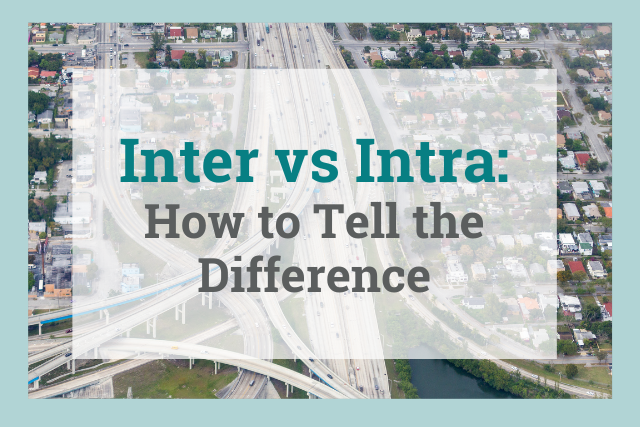
Inter and intra are confusing prefixes because they look so similar to one another. Because of this, they can be hard to tell apart. But what really is the difference?
Luckily, there are some pretty obvious differences between the two, and with a little practice, you’ll find that they are actually quite easy to use correctly. So, just read this guide and let us coach you through it like the person with the whistle at your intramural softball game. (Or was it an intermural league?)
Inter vs Intra
Let’s start with the definitions:
- Inter means between two or more things, people, or groups
- Intra means inside or within one thing, person, or group
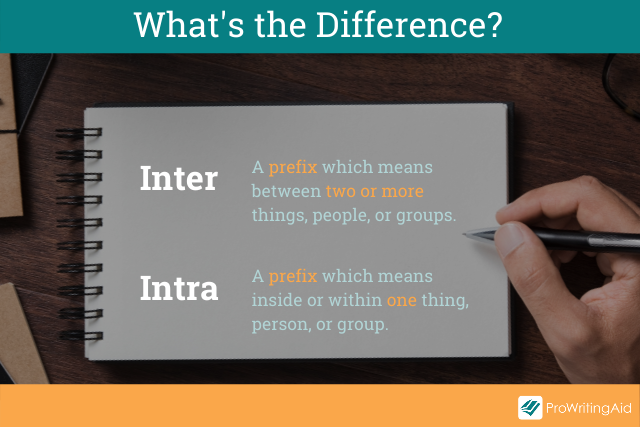
An easy way to remember this is that inter sounds like enter, and to enter, you have to first be somewhere else. So inter always implies that something goes through at least two places. (Think interstate, which is a highway that goes between different states.)
In my example above, you can remember if the league was intramural or intermural by thinking about who you played:
- Were the games all held within your university against other teams from the same school? That’s intramural.
- Were the games between teams from other schools? That’s intermural.
If it’s still a bit confusing, don’t worry. Let’s take a closer look at each prefix in turn.
Using the Prefix "Inter"
Let’s start with inter. Remember, this one means that more than one group or thing is involved.

Here are ten very common inter words that will help you remember this prefix:
Interaction: This is anything that occurs between at least two people or things. You’d have a hard time interacting with yourself!
Interrogate: This is a series of questions and answers, so it works best when there are at least two parties involved.
Interview: Once again, there needs to be someone doing the interview and someone being interviewed for this to work correctly.
Interlaced: This means crossed or interwoven (another inter word!), but to cross or weave something, you need at least two things involved.
Interface: This has two definitions, and both show the definition of inter. The first is the meeting spot between two things or people. The second is a device that allows a person to communicate with a computer. Either way, it is happening between at least two people, things, or groups.
Interfere: This is the process of getting in between something or stopping it from happening.
Interlope: This occurs when something or someone else interrupts (yet another inter word!) something or someone else.
Intercept: You do this by stopping something or someone from continuing to another destination.
Intercede: This happens when you step in for someone else or on behalf of someone else.
Interest: You become interested when you want to know more about something or someone else .
While these words can seem completely unrelated at times, they all have something very important in common: They involve at least two people or things. That’s why they use inter- as their prefix.
Now that inter is clear, let’s look at intra and see if we can make that one just as simple!
Using the Prefix "Intra"
Now let’s look at intra. This one is much more personal. It doesn’t work well with groups or outside objects.

Here are ten common words that will help you understand the prefix intra:
Intransitive: If you are looking for a grammar lesson within a grammar lesson, you’ve got one now! Intransitive verbs are verbs that don’t have a direct object following them. (Think: “I am writing” as opposed to “I wrote an example.”)
Intravenous: This one means within a vein. Basically an IV is something that goes into one vein.
Intranet: As opposed to the internet, which is between multiple groups because it has that inter prefix on it, an intranet is internal. It goes within one organization or group. Often, companies will have their own intranet.
Intransigent: Someone is said to be intransigent if they are so locked into their opinion or belief that they refuse to compromise on it.
Intrapersonal: This is something that happens within your own mind. Basically, intrapersonal skills are ones in which you act for yourself, such as willpower or self-discipline.
Intracranial: This one is a word to describe something happening within the skull.
Intramuscular: Similarly, this one describes something taking place within a muscle.
Intragroup: Don’t let this one fool you: This means that something is occurring within one group.
Intratextual: This means that it is occurring within one text (such as a book, letter, or text message).
Intraspecies: This means that something is occurring or happening within one species.
These words use the prefix intra because they go within one item or thing. So to keep up with this prefix, all you need to do is ask yourself if you are talking about something going within one thing or person or between two people or things. If it’s the former, then use intra. If it is the latter, use inter. However, that doesn’t mean there aren’t words out there that will confuse you.
In the next section, let’s talk about some of the tricky words.
Inter vs Intra: Common Points of Confusion
Despite all of the words above, remembering the differences between inter and intra isn’t always easy. There are a couple of reasons for this, and we’ll discuss both of them here.
Inter and Intra Are Often Each Other’s Antonyms
One of the biggest problems with trying to remember the differences between inter and intra is that they are often each other’s antonyms.
An antonym is a word that means the opposite of another word. Often, all you have to do to get the opposite of an inter- word is to make it intra- or vice versa.
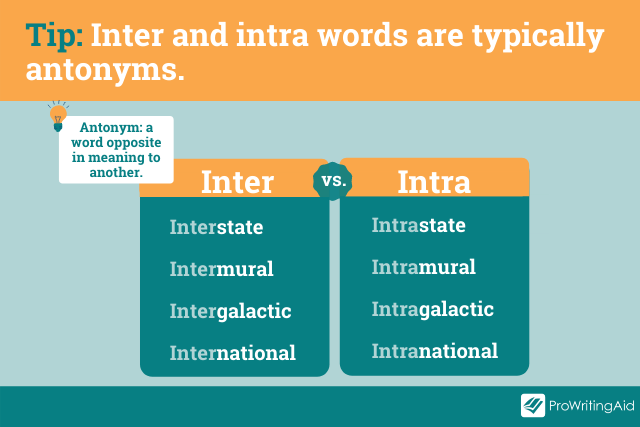
For example, we already covered the differences between intramural and intermural, but what about interstate or intrastate? International or intranational? Intergalactic or intragalactic?
All of these are words and they can complicate remembering the difference between inter and intra.
Luckily, there is an easy way to keep these apart:
Just think about the ones you know for sure.
In the examples above, you likely know what an interstate is—a major road that crosses state lines. Similarly, you know international is between multiple nations and intergalactic is between multiple galaxies.
That means, by contrast, an intrastate highway must only go within one state, intranational is only through one nation, and intragalactic must be within one galaxy.
Once you eliminate what you already know, it makes it a lot easier to figure out the rest!
The Word "Internal"
So by now everything is starting to make sense. You’ve figured it all out: The difference between intra and inter is clear…
...And then you remember the word internal.
Internal makes everything confusing because, based on the definitions we’ve just learned, it seems like it should really be intranel. Right?
Well, the truth is that internal isn’t actually using the prefix inter. It’s just a completely different word.
While it does complicate things, a good way to remember this is that prefixes go before a word. In all of the examples above, you could see the root word (state, net, cranial, etc.) In internal, there is no root word. Thus, it isn’t using a prefix.
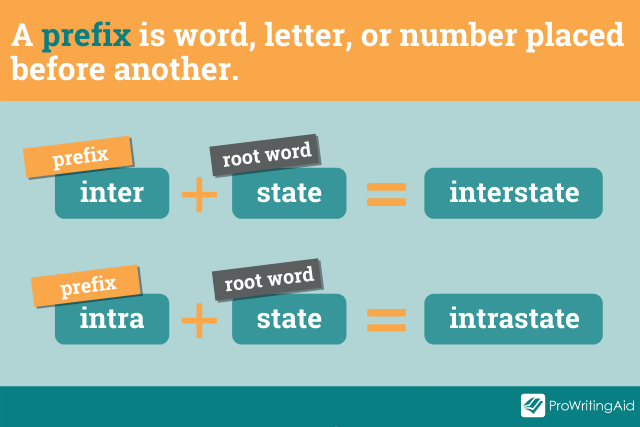
So don’t let it confuse you!
Now that you are fully fine with the differences between intra- and inter-, let’s complicate it a little more by looking at different ways to punctuate these words.
Inter, Intra, and the Complication of Hyphens
So you’re 100% sure that you should be using intracultural instead of intercultural (seeing as how you are talking about people within one culture), but now you have a new question:
Should it be intra-cultural or intracultural? (And what if you keep getting the squiggly red line on both?)
Let’s address that squiggly red line first. You’ll most likely notice this on words that are using the prefix intra. That’s because, in certain circumstances, these words are less common.
That’s okay. They are still right. And in moments of doubt, don't forget that the ProWritingAid’s Word Explorer tool is there to help you out.
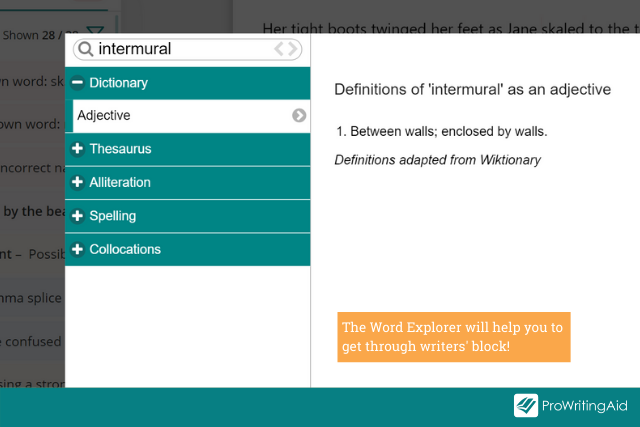
What about hyphens, though?
Well, the first rule of thumb is to always go by the style guide you are using. Many guides have sections on hyphens that will tell you exactly what words they expect to be hyphenated. Always go with the rules of the organization for which you are writing.
Outside of that, you’re probably fine not hyphenating. In general, that is the standard—which makes it really easy to remember!

That’s all there is to it! Once you remember that inter- means between two or more things/people and intra- means within one, you’ll never have trouble with these pesky prefixes again. Of course, if you do still struggle, remember you can always use ProWritingAid to help figure out the difference!

